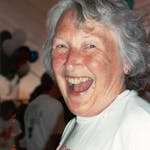The cover to a 2021 reissue of the album "Jazz From The North Coast, Volume 2" reads "Rare and Obscure," but to fans like Brad Eggen, the 1956 recording is simply legendary.
Pianist Herb Pilhofer had his pick of top Twin Cities sidemen to fill out his arrangements.
The drummer? "Of course, his first choice was Russ Moore on the trap set," Eggen said.
Russell "Russ" Moore, who later put in nearly 30 years as the day-to-day, straight-talking union leader representing the interests of fellow Twin Cities musicians, died in September at age 94 — never having had to work a "straight job" outside music to support his wife and three children, son James Moore said last week.
"Completely cool, always," Moore said of his father. "Kind but unwavering and totally committed to the Minnesota music scene."
Russ Moore grew up in St. Paul and often accompanied his father, Sidney, to the elder Moore's job as a motion picture operator at the Orpheum Theater in Minneapolis. There, artists like Cab Calloway and Ella Fitzgerald performed, and Russ hung out with the musicians backstage, eventually picking up a desire to play drums at age 13.
This was an era when nightclubs doubled as strip joints along Hennepin Avenue, and a jazz musician could make a living playing six nights a week, Moore said in a 2014 YouTube interview with the singer Patty Peterson.
But it was in St. Paul at a show at the Lowry Hotel where Moore — fresh out of Mechanic Arts High School — learned that the drummer for Joe Sanders of Nighthawks fame was leaving the band and his professional career began.
"I'm 18 years old," he said later. "All of a sudden, I'm playing in Chicago and Boston."
He toured with other acts like the Teddy Phillips Orchestra, and after returning from a military stint at Fort Riley, Kan., in 1952, became a "first call" drummer for Don Rickles, Vic Damone and the Smothers Brothers, among others.
Moore also performed with Jeanne Arland Peterson, mother of Patty Peterson, whose ability to play the B-3 organ still had him marveling in 2014.
"Your mother was one of the only B-3 people who played [with] her feet correctly," Moore told Peterson during their interview. "Most of them are stumbling down there and the time goes out the window."
"True," Peterson said. "My mother could kick some mean B-3."
In the 1960s, Moore also had a shop, Drumland, where he sold drums and gave lessons. Kenny Horst, future owner of the Artists' Quarter, was about 16 then and took a bus there for a lesson. But he needed a ride home. Sure, Moore said, but first Horst would have to come to his gig. He found himself in a dressing room with strippers.
"I've never forgiven him," Horst said, laughing.
In 1977, Moore became secretary-treasurer of the Twin Cities Musicians Union, and in 1989, he persuaded Eggen, an attorney and trumpet player, to be its president. The offer surprised Eggen, he said recently, for he'd been suing clubs to enforce union contracts, and he thought Moore was summoning him to tone it down.
"It changed my life having a chance to represent the people I care about in the industry," Eggen said. "That is why I'm so thankful to him."
In addition to his son, Moore is survived by daughter Diane Moore, sister Mary Jean Vento, two grandchildren and two great-grandchildren. Services have been held.





